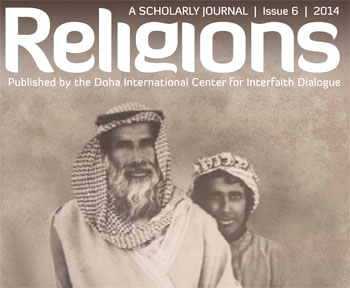
07 Sep Welcome to our Newest Adyan Issue
All the natural and cultural units of transmission and heritage, such as the family and the homeland, enjoy a dual relationship with the principles and goals of religious traditions.
On the one hand, natural and social bonds nurture human beings, and play an essential role in the transmission and strengthening of religious identity. The family, in particular, is to be highlighted in this respect, for it is within its fold that the most precious moral and cultural values are passed on, together with the loving care that is the emotional energy, as it were, in the process of raising a child into adulthood.
The very verb“to raise” is highly indicative of a development whereby the “horizontal” nature of the infantis brought up to be elevated along the vertical “standing” of the adult. This vertical motionisa fitting symbol of religious teachings and theiraiming at transcendence.
When contemporary religious movements espouse andpromoteso-called “family values” they refer, explicitly or implicitly, to this networkof human interactions through which an adult becomes part of acommunity of the faithful, and can thereby relate to the Divine within the meaningfuland transformative context of a religiousculture and civilization. It is as a child of men and womenthat someone may be prepared to reach the goals of religion. Hence, there is no religion that does not preach the love of parents,siblings, spouses and children, since the natural is the soil in which the supernatural maygrow.
The Bible teaches: “Honor your father and your mother: that your days may be long on the land which the Lord your God gives you” (Exodus 20:12) and the Quran enjoins similarly: “And lower unto them (your parents) the wing of submission through mercy, and say: My Lord! Have mercy on them both as they did care for me when I was little.” (17:24)
This is not, however, the only aspect of the question for, on the other hand, natural kinship and religion may come into a state of tension, and even opposition. This happens when the former stand in the way of what is, for religions, the highes tvocation of mankind, that is transcendence.
Hence, even religious traditions that are most emphatically teaching the religious and moral significance of the family, the ethnic group or the homeland, are noless clear in alerting their faithful to the potential obstacle represented by natural and socio-culturalrelations. Religiously speaking, any human relationship, as intimate and profound as it may be, remains unfulfilled if not situated within the context of a relationship with the Divine. This is why, among other reasons, heritage and transmission are also, and above all, the purview of religious institutions of learning and authoritative scholars and masters.
Many thinkers, both in the Western and Islamic scholarly traditions, have for that reason raised the degree of the teacher far above that of the biological father. Short of its fulfillment into spiritual brotherhood natural kinship remains spiritually lacking, and it potentially or actually obstruct the way to the highest inner vocation of mankind. It therefore remains also a possible source of inner and outer conflict. This is what is taught by the Gospel and the Quran alike: “For I am come to set a man at variance against his father, and the daughter against her mother, and the daughter in law against her mother in law” (Matthew 10:35) and “O ye who believe! Lo! among your wives and your children there are enemies for you, therefore beware of them. And if ye efface and overlook and forgive, then lo! Allah is Forgiving, Merciful.” (64:14)
So what happens when the influence of religions has become marginal in society? How does religion position itself in view of the defense of its norms without colliding with a secular ambience or the various modes of deviated understanding that surround it? This is an urgent question that some of the following essays address from a variety of perspectives, either directly or indirectly. The complex and challenging role of religion is to preserve the transmission of that which lies beyond any transmission, for virtue and loving service of God cannot be transmitted but only realized, and this is ultimately a personal privilege and responsibility.The best that can be done is to foster ambiencesin which such realizations are made possible, at a time when experiences of this kind have grown as rare as nurturing instances of authentically religious influence on society.
Patrick Laude
Senior Editor



Sorry, the comment form is closed at this time.